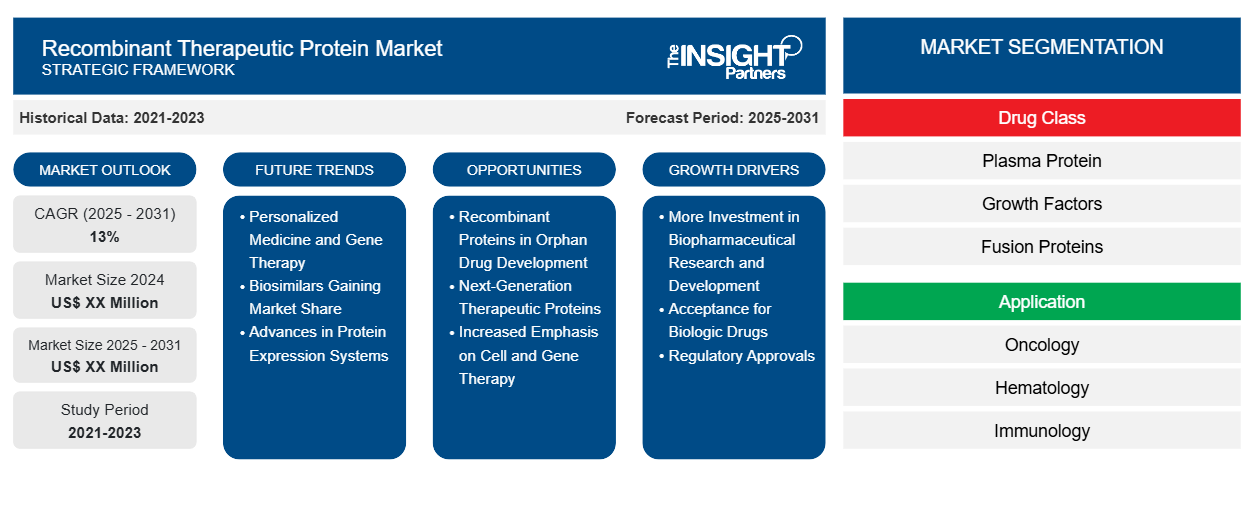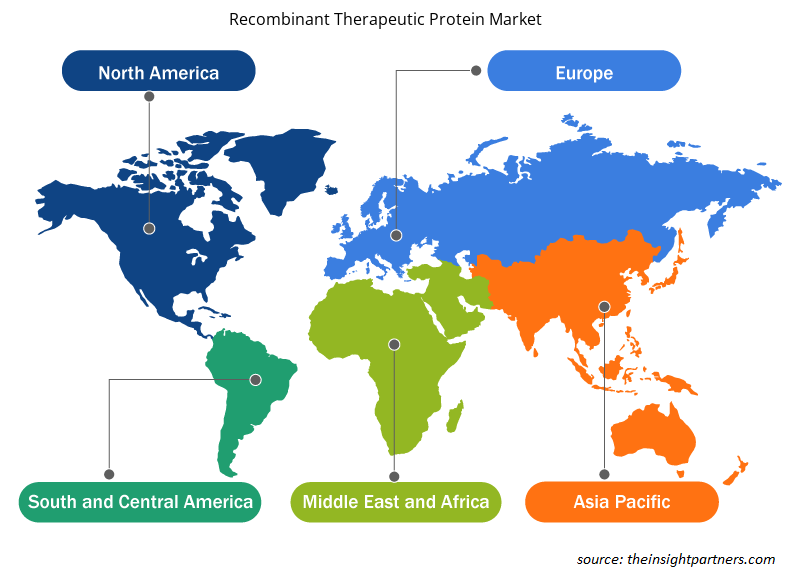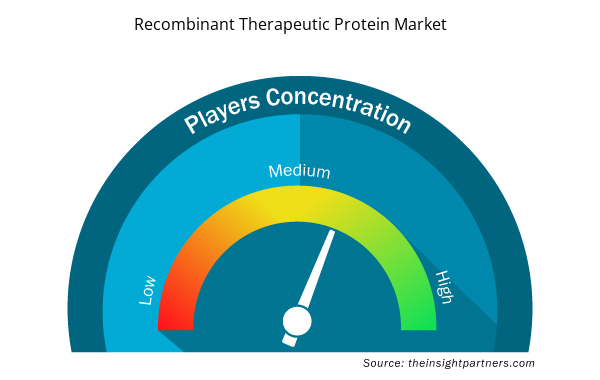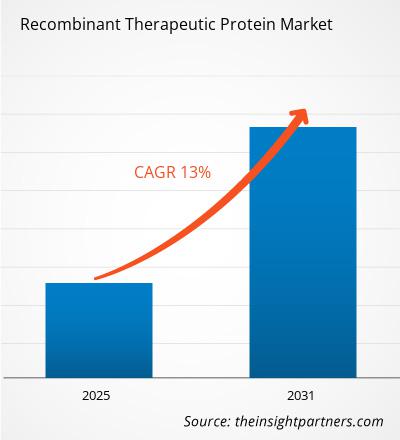The Recombinant Therapeutic Protein Market is expected to register a CAGR of 13% from 2025 to 2031, with a market size expanding from US$ XX Million in 2024 to US$ XX Million by 2031.
The research report is categorized by product type into the following subsegments: Monoclonal Antibodies, Hormones, Growth Factors, and Others. It further presents an analysis based on application, including Oncology, Diabetes, Genetic Disorders, and Others. Additionally, The report evaluates end-users, such as Pharmaceutical Companies, Research Institutions, and Hospitals. The global analysis is broken down at the regional level and major countries, covering key regions like North America, Europe, Asia Pacific, the Middle East & Africa, and South America. The market evaluation is presented in US$ for the above segmental analysis.
Purpose of the Report
The report Recombinant Therapeutic Protein Market by The Insight Partners aims to describe the present landscape and future growth, top driving factors, challenges, and opportunities. This will provide insights to various business stakeholders, such as:
- Technology Providers/Manufacturers: To understand the evolving market dynamics and know the potential growth opportunities, enabling them to make informed strategic decisions.
- Investors: To conduct a comprehensive trend analysis regarding the market growth rate, market financial projections, and opportunities that exist across the value chain.
- Regulatory bodies: To regulate policies and police activities in the market with the aim of minimizing abuse, preserving investor trust and confidence, and upholding the integrity and stability of the market.
Recombinant Therapeutic Protein Market Segmentation
Drug Class
- Plasma Protein
- Growth Factors
- Fusion Proteins
- Monoclonal Antibodies
- Hormones
- Enzyme
- Coagulation Factors
Application
- Oncology
- Hematology
- Immunology
- Endocrinology
- Cardiovascular Disease
Customize This Report To Suit Your Requirement
You will get customization on any report - free of charge - including parts of this report, or country-level analysis, Excel Data pack, as well as avail great offers and discounts for start-ups & universities
Recombinant Therapeutic Protein Market: Strategic Insights

- Get Top Key Market Trends of this report.This FREE sample will include data analysis, ranging from market trends to estimates and forecasts.
Recombinant Therapeutic Protein Market Growth Drivers
- More Investment in Biopharmaceutical Research and Development: Biopharmaceutical R&D investments drive growth in the recombinant therapeutic protein sector. Many organizations and companies put their money into biologic therapy research to develop recombinant proteins. Investment helps scientists find new therapeutic proteins faster as well as develop them sooner. Research activities that never stop and the growing focus on biologic medications drive the recombinant therapeutic protein market to expand.
- Acceptance for Biologic Drugs: Medical practices now heavily favor biologic drugs to treat chronic diseases. Patients receive recombinant therapeutic proteins from biologics because these drugs show better precision and safety compared to small-molecule medicines. Patients and doctors select biologics for medical therapy because these molecules provide precise solutions that treat cancer and autoimmune diseases alongside genetic disorders. More people require recombinant therapeutic proteins because of this development.
- Regulatory Approvals: The market showed continuous growth because the FDA approved recombinant therapeutic proteins. The U.S. FDA and European Medicines Agency (EMA) adopted simpler methods to approve biologic drugs which makes it easier for recombinant therapeutic proteins to enter the market. More treatments are moving through clinical trials and getting regulatory approval so patients now have access to a broader selection of medicines. The financial success of selected recombinant therapeutic proteins leads to more funding and research in this sector.
Recombinant Therapeutic Protein Market Future Trends
- Personalized Medicine and Gene Therapy: Personalized medicine leads all trends in the recombinant therapeutic protein sector. Scientists now create recombinant proteins that precisely target genetic diseases thanks to medical research. The field of recombinant protein treatment now includes gene therapy methods that repair damaged patient cells. Healthcare providers can now treat patients effectively and personalize care thanks to the merging of gene therapy and recombinant proteins which may lead to permanent cures or long-term management of chronic diseases.
- Biosimilars Gaining Market Share: The biosimilars market is expanding quickly because patents are ending for well-known recombinant therapeutic proteins like monoclonal antibodies. The close copies of original biologic drugs known as biosimilars help people save money by giving them cheaper options than brand name biologics. The market for recombinant therapeutic proteins shows biosimilar adoption as its leading trend. The market will expand further because patients can now get access to expensive biologics and because manufacturers will face stronger competition.
- Advances in Protein Expression Systems: New methods to produce proteins are changing how the market makes therapeutic proteins. Organisms used for protein production like bacteria yeast and mammalian cells are being enhanced to produce better quality proteins at higher amounts. Researchers test insect cell and plant-based methods as better alternatives to existing production systems. New production methods help manufacturers create better proteins faster while lowering production expenses for patients and companies.
Recombinant Therapeutic Protein Market Opportunities
- Recombinant Proteins in Orphan Drug Development: Through recombinant therapeutic proteins medical researchers now have the chance to develop effective treatments for rare diseases that traditional medicine ignored. Special genetic conditions need treatments that recombinant proteins can deliver. Companies receive legal protections and special market access when they develop recombinant protein drugs for rare diseases through the orphan drug approval process. Developing drugs for orphan diseases brings both medical benefits to patients and profitable markets for pharmaceutical companies.
- Next-Generation Therapeutic Proteins: There are many chances today to create better therapeutic proteins through recombinant technology. Biotech scientists make better therapeutic proteins through bispecific antibodies, fusion proteins, and engineered proteins that work more effectively with higher stability. As scientists learn more about protein biology, they will develop better protein therapies that improve how we treat different medical conditions. Investment in next-generation proteins helps companies lead the recombinant therapeutic protein market while meeting patient needs for better treatments.
- Increased Emphasis on Cell and Gene Therapy: Cell and gene therapy together with recombinant therapeutic proteins creates fresh market growth prospects. Scientists use recombinant proteins to deliver therapeutic genes and control gene expression during cell and gene therapy treatments in patients. Rephrase the following sentence. Keep the sentences direct, flowing, and easy to understand. Also normalize verbalization when possible. The biotechnology and gene therapy sectors will keep using recombinant proteins more because of this growth which creates fresh ways to treat patients.
Recombinant Therapeutic Protein Market Regional Insights
The regional trends and factors influencing the Recombinant Therapeutic Protein Market throughout the forecast period have been thoroughly explained by the analysts at Insight Partners. This section also discusses Recombinant Therapeutic Protein Market segments and geography across North America, Europe, Asia Pacific, Middle East and Africa, and South and Central America.

- Get the Regional Specific Data for Recombinant Therapeutic Protein Market
Recombinant Therapeutic Protein Market Report Scope
| Report Attribute | Details |
|---|---|
| Market size in 2024 | US$ XX Million |
| Market Size by 2031 | US$ XX Million |
| Global CAGR (2025 - 2031) | 13% |
| Historical Data | 2021-2023 |
| Forecast period | 2025-2031 |
| Segments Covered |
By Drug Class
|
| Regions and Countries Covered | North America
|
| Market leaders and key company profiles |
Recombinant Therapeutic Protein Market Players Density: Understanding Its Impact on Business Dynamics
The Recombinant Therapeutic Protein Market market is growing rapidly, driven by increasing end-user demand due to factors such as evolving consumer preferences, technological advancements, and greater awareness of the product's benefits. As demand rises, businesses are expanding their offerings, innovating to meet consumer needs, and capitalizing on emerging trends, which further fuels market growth.
Market players density refers to the distribution of firms or companies operating within a particular market or industry. It indicates how many competitors (market players) are present in a given market space relative to its size or total market value.
Major Companies operating in the Recombinant Therapeutic Protein Market are:
- Bristol-Myers Squibb
- Celldex Therapeutics, Inc.
- Eli Lilly and Company
- GlaxoSmithKline plc
- Merck & Co., Inc.
- Novartis International AG
Disclaimer: The companies listed above are not ranked in any particular order.

- Get the Recombinant Therapeutic Protein Market top key players overview
Key Selling Points
- Comprehensive Coverage: The report comprehensively covers the analysis of products, services, types, and end users of the Recombinant Therapeutic Protein Market, providing a holistic landscape.
- Expert Analysis: The report is compiled based on the in-depth understanding of industry experts and analysts.
- Up-to-date Information: The report assures business relevance due to its coverage of recent information and data trends.
- Customization Options: This report can be customized to cater to specific client requirements and suit the business strategies aptly.
The research report on the Recombinant Therapeutic Protein Market can, therefore, help spearhead the trail of decoding and understanding the industry scenario and growth prospects. Although there can be a few valid concerns, the overall benefits of this report tend to outweigh the disadvantages.
- Historical Analysis (2 Years), Base Year, Forecast (7 Years) with CAGR
- PEST and SWOT Analysis
- Market Size Value / Volume - Global, Regional, Country
- Industry and Competitive Landscape
- Excel Dataset



Report Coverage
Revenue forecast, Company Analysis, Industry landscape, Growth factors, and Trends

Segment Covered
This text is related
to segments covered.

Regional Scope
North America, Europe, Asia Pacific, Middle East & Africa, South & Central America

Country Scope
This text is related
to country scope.
Frequently Asked Questions
The Recombinant Therapeutic Protein Market is expected to register a CAGR of 13% from 2025-2031.
The major factors impacting the Recombinant Therapeutic Protein Market are: Rising investment in biopharmaceutical research and acceptance of biologic drugs
Key future trends in Recombinant Therapeutic Protein market are - Personalised medicine and gene therapy, Increased market share for biosimilars
Key companies of Recombinant Therapeutic Protein market are: Bristol-Myers Squibb, Celldex Therapeutics, Inc., Eli Lilly and Company, GlaxoSmithKline plc, Merck & Co., Inc., Novartis International AG, Schering AG, Johnson & Johnson
The report can be delivered in PDF/PPT format; we can also share excel dataset based on the request.
Some of the customization options available based on request are additional 3–5 company profiles and country-specific analysis of 3–5 countries of your choice. Customizations are to be requested/discussed before making final order confirmation, as our team would review the same and check the feasibility.
Trends and growth analysis reports related to Life Sciences : READ MORE..
1. Bristol-Myers Squibb
2. Celldex Therapeutics, Inc.
3. Eli Lilly and Company
4. GlaxoSmithKline plc
5. Merck & Co., Inc.
6. Novartis International AG
7. Schering AG
8. Johnson & Johnson

 Get Free Sample For
Get Free Sample For